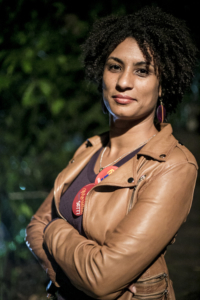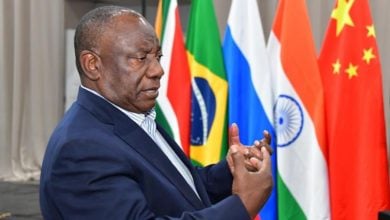
The cold-blooded execution of Rio de Janeiro’s city council representative Marielle Franco has sent Brazilians into the streets in an outpouring of grief, outrage — and fight back.
The Wednesday night killing left Franco and her driver dead. Franco had just left an event on empowering Black women.
On Thursday, thousands protested at Cinelândia square and elsewhere in downtown Rio. Thousands more closed Avenida Paulista in São Paulo. Demonstrations have taken place in the capital Brasília and in virtually all major cities across the Brazil, along with solidarity demonstrations in New York, Lisbon and other cities across the world. Countless displays of support have flooded social networks.
Franco’s life and personal struggle reflected the realities of millions of impoverished and marginalized residents of Rio de Janeiro. A Black woman and a single mother, she was born and raised in Favela da Maré, one of the poorest and most violent communities in Rio de Janeiro. Franco started working at 11 years of age, eventually overcoming great odds to earn a degree in Social Sciences and a masters in Public Administration. She was a human rights activist, a member of the LGBTQ community, a feminist and anti-racist fighter.
Her election to Rio’s Municipal Chamber in 2016 took the political establishment by surprise. Running with the left party PSOL (Socialism and Liberty Party) as a first-time candidate, Franco came in fifth in number of votes among the 51 elected members of the legislative chamber. Her stunning victory brought an earnest and courageous voice for the oppressed into a political arena dominated by representatives of Rio’s wealthy and mostly white elites. She was beloved by the communities she represented and admired for her principles.
Among the many struggles she embraced, Franco was a fearless and vocal opponent of police brutality. It was the loss of a friend to a stray bullet fired during a police raid in 2000 that propelled her to become a human rights activist. Franco did not mince words in condemning police killings in Rio’s favelas and the prevalence of impunity and injustice.
With the takeover of Rio’s security apparatus by the Brazilian military in February of this year, Franco’s criticisms gained a new dimension.
The military intervention, authorized by the illegitimate coup president Michel Temer, has touched a raw nerve within Brazilian society and stirred memories of the military dictatorship that ruled from 1964 to 1985. Right-wing forces are using Rio to test the waters for military intervention and are already considering extending it to other parts of the country.
Franco’s unapologetic condemnation of brutal and corrupt police forces and the military intervention are a likely motive behind her killing.
Live for the people, die for the people
Evidence points to a planned execution by police. No valuables were stolen from the car where Franco was killed. Despite tinted windows, the killers knew where in the car Franco sat. The bullets belonged to an ammunition lot sold to Federal Police, the same lot linked to the 2015 Osasco massacre where police took the lives of 23 people — the largest extrajudicial killing to ever take place in the state of São Paulo. A witness whose identity has not been revealed told investigators that São Paulo police sold the ammunition to Rio police.
Brazilians are all too familiar with police brutality. According to the Institute of Public Security, 1,124 killings took place at the hands of police in 2017 in Rio alone. This pattern is repeated in other major urban centers, where the right wing whips up fear of violent crime to garner support for police intervention and repression in favelas. In rural areas, landless campesinos face death in the hands of police and hired guns for challenging the concentration of land in the hands of wealthy landowners. The Citizen Council for Public Security and Criminal Justice states that Brazil has 19 of the 50 most violent cities in the world.
But Franco’s execution is not just another statistic. It is a brutal expression of the racist contempt of the state apparatus and the Brazilian elites for the poor and people of color. Her killers were not looking to silence an individual, but to silence the demands and aspirations of the oppressed workers whom Franco had come to represent. It is part and parcel of the assault on the social gains and political space carved out by the Brazilian masses through decades of struggle.
With the looming sham exclusion of former president Lula from the October presidential race — one he would almost surely win — and the killing of Franco, it is clear that the power structures in Brazil are willing to concede nothing to the working class, and will trample over even the most modest democratic rights.
This murderous attempt at political intimidation has backfired.
Brazilians are standing up against political violence and military intervention, and demanding justice. If Marielle Franco’s life symbolizes the inroads made by poor and marginalized Brazilians, her death is now an inspiration for millions of others to take up this fight. As signs carried by protesters stated, “Transformo luto em luta” — “I turn grief into struggle.”
Marielle Franco, presente!
The author was born and raised in Rio de Janeiro, Brazil.






